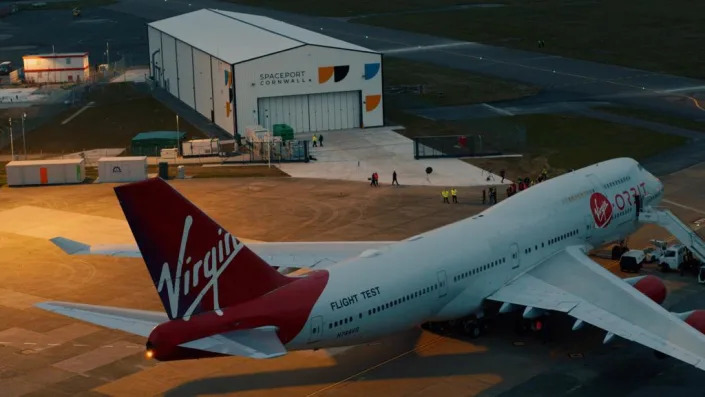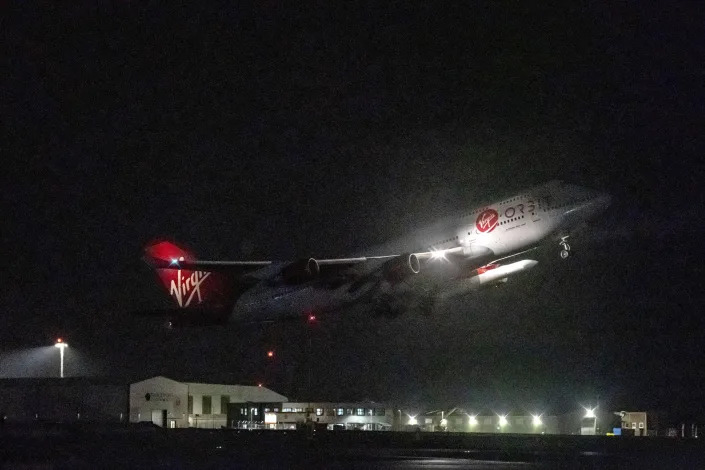THE BIGGEST FAILURE IN SPACE RACE2.0
Virgin Orbit says issue with rocket's second stage led to mission failure
Aria Alamalhodaei
Thu, January 12, 2023
Virgin Orbit, the unconventional rocket company founded by billionaire Sir Richard Branson, said its mission failure earlier this week was due to an anomaly with the rocket’s second stage.
Although the LauncherOne rocket managed to reach space and achieve stage separation, the anomaly prematurely terminated the first burn of the upper stage’s engines, at an altitude of around 180 kilometers, Virgin said in a statement. Due to this engine anomaly, both the rocket components and payload fell back to Earth and were destroyed upon atmospheric reentry.
The mission payload consisted of nine small satellites, including two CubeSats for the United Kingdom’s Ministry of Defense, a first test satellite from Welsh in-space manufacturing startup Space Forge and what would’ve been Oman’s first earth observation satellite.
Virgin Orbit engineers and board members have already begun an analysis of mission telemetry data to identify the cause of the anomaly. The company added that a formal investigation into the source of the failure will be led by Jim Sponnick, former VP for the Atlas and Delta launch system programs at United Launch Alliance, and Virgin Orbit’s chief engineer, Chad Foerster.
The company said the investigation will be complete, and corrective measures implemented, before LaucherOne’s next flight from California’s Mojave Air and Space Port. But how long that will take, and when we’ll next see Virgin’s Boeing 747 and rocket system take to the air again, is far from clear. Virgin said it was in talks with the U.K. government to conduct another launch from the country’s new Space Port in Cornwall for “as soon as later this year.”
That degree of uncertainty is never good for a public company, but it’s likely especially straining for Virgin Orbit, which is facing dwindling cash reserves and a pressing need to ramp up launch cadence to boost revenues. As of September 30, the company had $71 million in cash on hand; by the end of the year, Virgin got an injection of $25 million from Richard Branson’s Virgin Group and $20 million from Virgin Investments Ltd. But these funds will do little but delay the inevitable if Virgin doesn’t return to launch soon.
Virgin Orbit clarifies the cause behind its 'Start Me Up' mission's failure to reach orbit
The anomaly that aborted the attempt has been identified as a 'premature shutdown of first burn of second stage.'
Matthew Horwood via Getty Images
Andrew Tarantola
·Senior Editor
Thu, January 12, 2023
Everything was going great until it wasn't in the skies over Cornwall, UK on Monday. Virgin Orbit, the space launch division of Sir Richard Branson's sprawling commercial empire, was in the midst of setting a major milestone for the country and the nation: to be the first orbital launch from European soil. The carrier aircraft, Cosmic Girl, had successfully taken off from Spaceport Cornwall, LauncherOne had cleanly separated from the modified 747 and properly ignited its first stage rocket, blasting it and its payload of satellites into space. But before they could be pushed into their proper orbit by the rocket's second stage, something went wrong. On Thursday, Virgin Orbit leaders provided a preliminary explanation as to just what happened.
"At an altitude of approximately 180 km, the upper stage experienced an anomaly. This anomaly prematurely ended the first burn of the upper stage," the company told Engadget via email. "This event ended the mission, with the rocket components and payload falling back to Earth within the approved safety corridor without ever achieving orbit."
Virgin Orbit has also announced a "formal" investigation into the root causes of the anomaly which will be led by Jim Sponnick, who developed the Atlas and Delta launch systems, and Chad Foerster, Virgin Orbit's Chief Engineer. Despite the setback, the company is already in contact with UK officials to reschedule the launch for as soon as late 2023.
Virgin Orbit: Premature shutdown behind rocket launch fail


Britain Start Me Up Launch
A repurposed Virgin Atlantic Boeing 747 aircraft, named Cosmic Girl, carrying Virgin Orbit's LauncherOne rocket, takes off from Spaceport Cornwall at Cornwall Airport, Newquay, England, Monday, Jan. 9, 2023. The plane will carry the rocket to 35,000 feet where it will be released over the Atlantic Ocean to the south of Ireland, as part of the Start Me Up mission and the first rocket launch from U.K. The rocket will take multiple small satellites, with a variety of civil and defence applications, into orbit. (Ben Birchall/PA via AP)
Thu, January 12, 2023
LONDON (AP) — Virgin Orbit said Thursday its first attempt to launch satellites into orbit from the U.K. failed after its rocket's upper stage prematurely shut down.
The U.S.-based company used a modified Boeing 747 plane to carry one of its rockets from Cornwall in southwestern England over the Atlantic Ocean on Monday. The plane released the rocket, which carried nine small satellites, but the rocket failed to reach orbit.
In a statement Thursday, Virgin Orbit said initial data indicated that the first stage of the rocket performed as expected. It said the rocket reached space altitudes, and that stage separation and ignition of the upper stage occurred in line with the mission plan.
But it said that later in the mission, at an altitude of approximately 180 kilometers (112 miles), "the upper stage experienced an anomaly. This anomaly prematurely ended the first burn of the upper stage,” the company said.
The plane, piloted by a Royal Air Force pilot, returned to Cornwall. The rocket components and the satellites were destroyed.
The launch failure was a disappointment to the company and U.K. space officials, who had high hopes that the mission — the first such one to be attempted from Europe — would be the beginning of more commercial space launch ventures.
Virgin Orbit, which was founded by British billionaire Richard Branson in 2017, began commercial launching services in 2021. It had previously successfully completed four similar launches from California, carrying payloads for businesses and governmental agencies into orbit.
The company has launched an investigation into the source of the second stage failure on Monday. It said it plans to carry out its next mission from the Mojave Air and Space Port in California, and that it is in talks with officials and businesses to return to the U.K. for another potential launch “as soon as later this year.”
Thu, January 12, 2023
LONDON (AP) — Virgin Orbit said Thursday its first attempt to launch satellites into orbit from the U.K. failed after its rocket's upper stage prematurely shut down.
The U.S.-based company used a modified Boeing 747 plane to carry one of its rockets from Cornwall in southwestern England over the Atlantic Ocean on Monday. The plane released the rocket, which carried nine small satellites, but the rocket failed to reach orbit.
In a statement Thursday, Virgin Orbit said initial data indicated that the first stage of the rocket performed as expected. It said the rocket reached space altitudes, and that stage separation and ignition of the upper stage occurred in line with the mission plan.
But it said that later in the mission, at an altitude of approximately 180 kilometers (112 miles), "the upper stage experienced an anomaly. This anomaly prematurely ended the first burn of the upper stage,” the company said.
The plane, piloted by a Royal Air Force pilot, returned to Cornwall. The rocket components and the satellites were destroyed.
The launch failure was a disappointment to the company and U.K. space officials, who had high hopes that the mission — the first such one to be attempted from Europe — would be the beginning of more commercial space launch ventures.
Virgin Orbit, which was founded by British billionaire Richard Branson in 2017, began commercial launching services in 2021. It had previously successfully completed four similar launches from California, carrying payloads for businesses and governmental agencies into orbit.
The company has launched an investigation into the source of the second stage failure on Monday. It said it plans to carry out its next mission from the Mojave Air and Space Port in California, and that it is in talks with officials and businesses to return to the U.K. for another potential launch “as soon as later this year.”
No comments:
Post a Comment